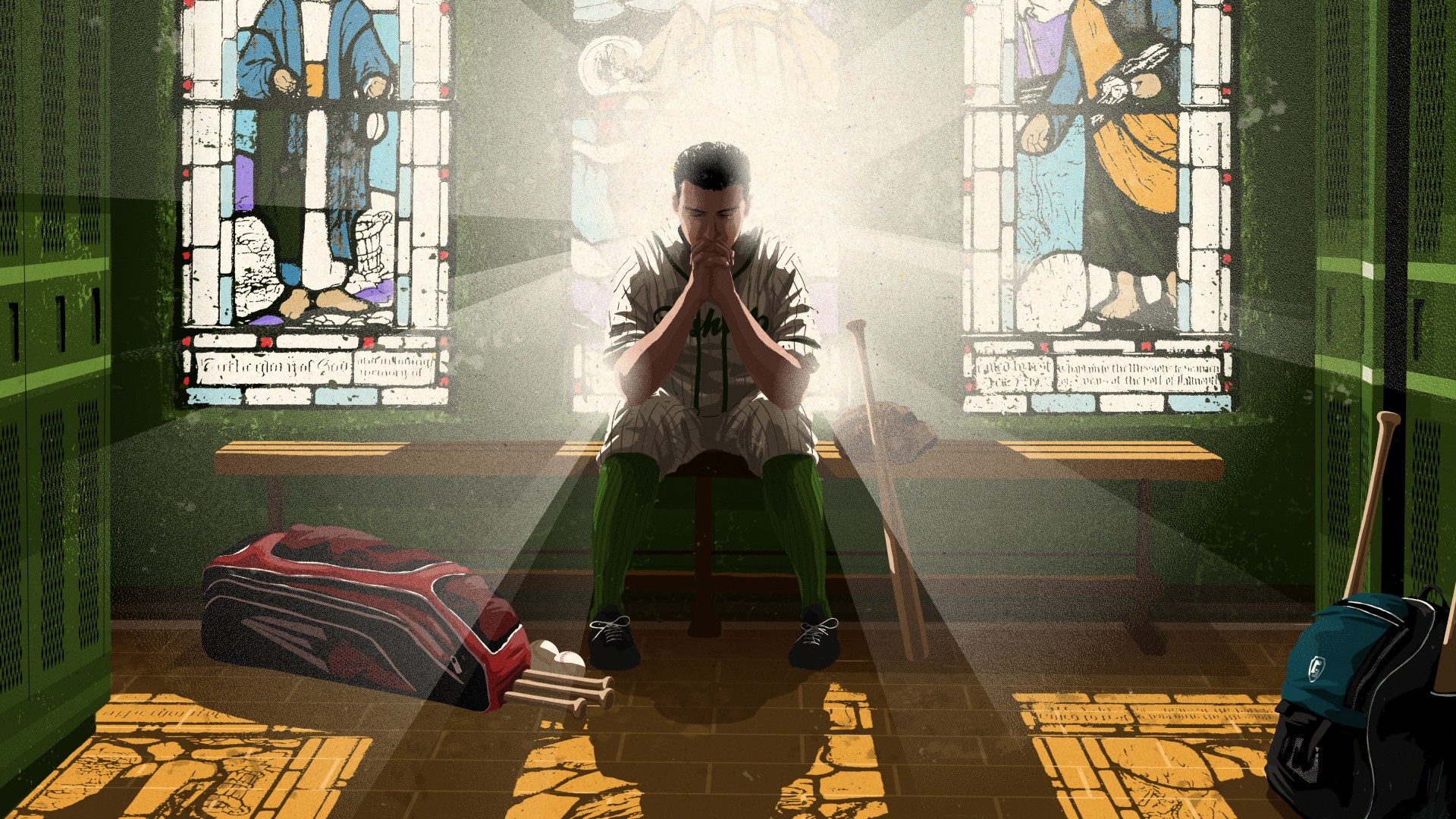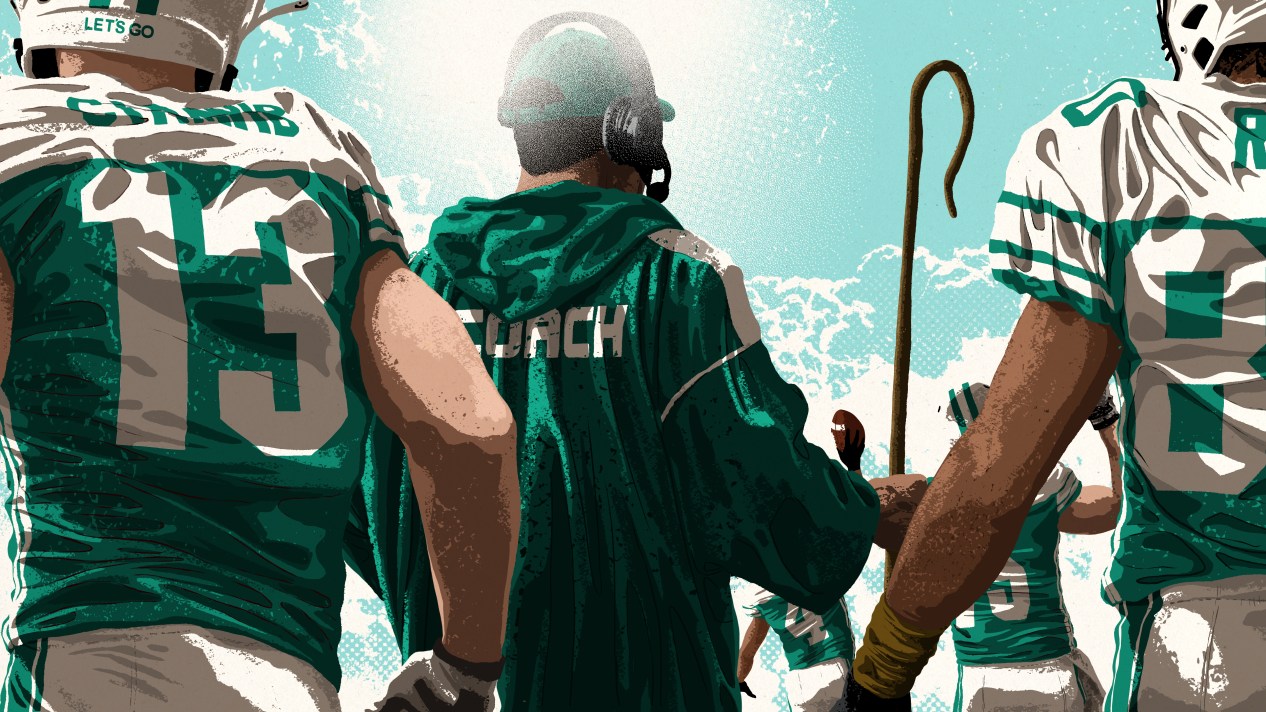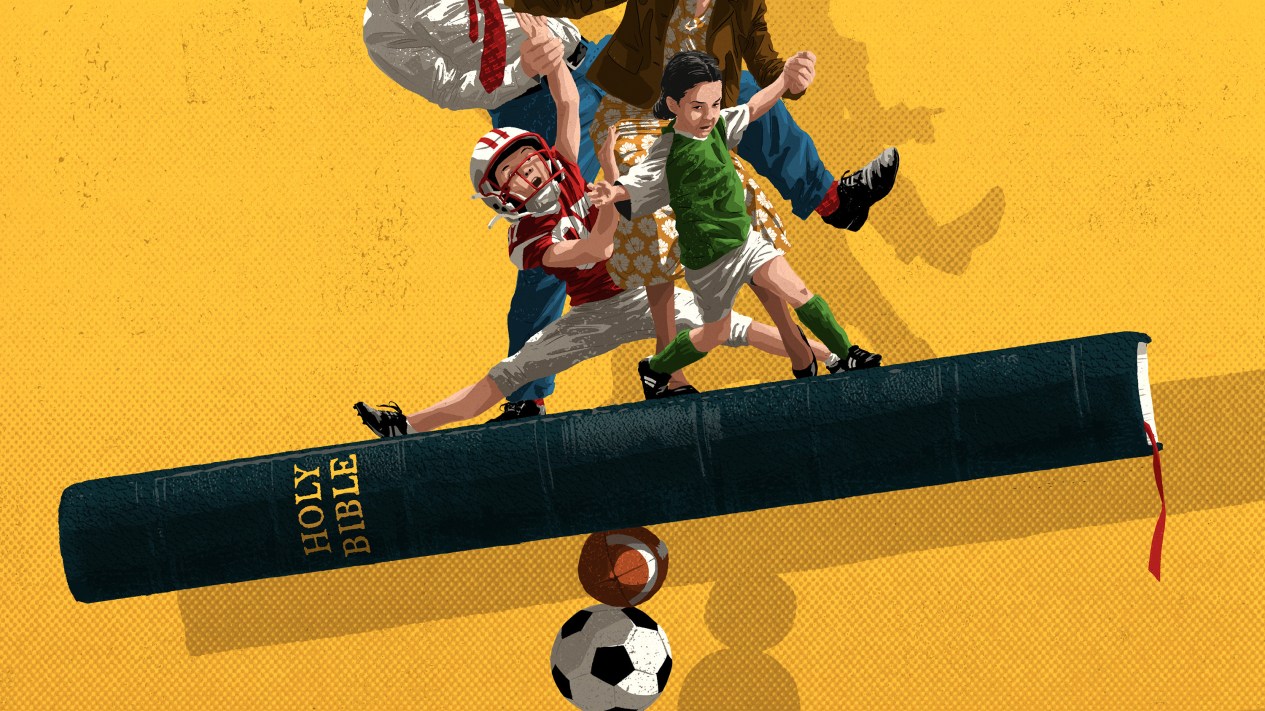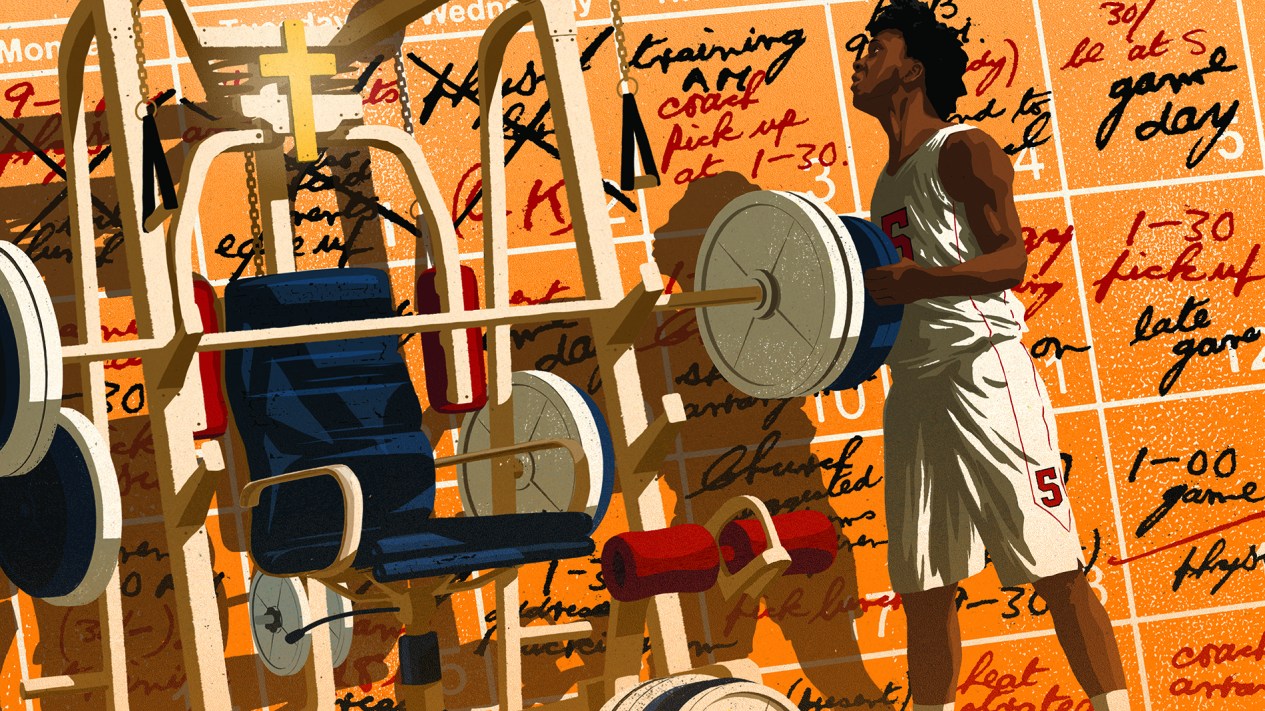As a student at McNeese State University, Dani Price felt like the two most important things in her life were held in separate hands. In one, she gripped her Christian faith, and in the other, she clung to her college softball career.
She prayed before and after games. “I can do all things through Christ who strengthens me” was one of her mantras. She fervently believed that God had a plan for her life. And she assumed she would have positive outcomes, in the form of winning streaks or scholarship money. But she never fully integrated her faith with the game. After a few years of playing at a collegiate level, dealing with the stress, expectations, and disappointments of high-pressure sports, Price’s approach just wasn’t working. It felt dualistic and unconnected.
Baylor University basketball player Jessika Caldwell had a similar experience. Growing up, she didn’t understand what it meant to incorporate her faith into sports. She viewed them as two separate entities, not seeing how to pair them beyond acknowledging God after a win, praying before a game, or recognizing that God had given her all her gifts and talents.
But while in the Czech Republic with a sports outreach team, Caldwell felt the two merging in a way they never had before.
“During a drill in the midst of practice, there was a pause,” Caldwell recalls. During that pause, she remembered something she’d heard in her pre-trip training about where Jesus showed up in sports: “downtime is his time.” As someone who craved the ability to see, hear, and feel her faith in the context of athletics, the perspective of approaching a mid-drill, practice, or game pause as Jesus’ time was a game changer. He didn’t just belong in a prayer before the game or an acknowledgment afterwards—he was right there in the midst.
John White, director of the Faith & Sports Institute at Baylor University’s George W. Truett Theological Seminary, says that when athletes begin to understand how God is with them in every athletic moment, they can be liberated to embrace sports as a playground where they experience freedom and the joy of self-discovery.
Instead of being a wall that boxes in athletes, sports can act as a window that demonstrates God’s work in their lives. After all, White argues, sports aren’t something done in addition to one’s faith—they themselves are an expression of worship and an act of faith, one that can often look like play.
Now campus chaplain and head girls basketball coach for Valor Christian High School in Highlands Ranch, Colorado, Caldwell helps teach young athletes to connect their talents and triumphs into their playful practice of faith. Price, now a college softball coach, strives to teach a similar lesson. “If Christ's love for me defines who I am,” she says, “then how I interact in sports is going to come out of that.”
When Price and Caldwell began to think differently about the ways their Christian faith meshed with their lives as athletes, it didn’t result in their backing away from sports as though it were a spiritual hindrance. Rather, they found themselves playing harder because they felt the overwhelming fear of failure lose much of its bite.
Now, as coaches, they model play as an act of worship as they build teams, devise strategies, and dream up maneuvers that are literally called plays. They mirror God’s creativity and innovation, showing their students what a joy it can be to engage sports as a God-given playground.
Starting with God’s Design
If we want to understand how to think of sports in a richer way, White believes we should go back to the very beginning. One of the doctrines Christians believe about the Creator God is that God’s identity is one essence expressed in three distinct persons (Father, Son, and Holy Spirit).The act of creation was performed by the community we call the Trinity—and it was the initial act of play.
White explains that the church fathers framed the divine life with the metaphor of dance. They described this dance of the divine life with the Greek word perichoresis, which means “mutual indwelling.” The Trinity, then, is a mutual, dynamic partnership, perfect communion in eternal motion, where, White notes, each person freely and fully gives and receives from the others, like a choreographed dance.
This understanding of the Trinity can provide believers with a strong foundation for better thinking about how we relate to one another, one that reverberates in particular with athletes. Though certainly not perfect like the community of the Father, Son, and Holy Spirit, an analogous relational dynamic can occur when competitors freely and lovingly strive together in the play-full quest of sports.“We have a tendency to think of God as more of a worker or creator,” says White. “But we see this imagery of God as a player too.”
White points to Proverbs 8:22–36, where Wisdom is personified as a “playful partner” of God who delightfully breaks into song and dance before God and the earth. Scholars have pointed to Wisdom in this passage as an eyewitness to creation as a joyful act of child’s play. Child’s play like, perhaps, the first dribbles of a basketball or strokes in a swimming pool.
This notion of play need not diminish the creational goodness of work. As humans in action, the embodied activity of sports allows us to bring to fruition our God-given potentials; it can involve both the earnest pursuit of excellence and the spontaneous expression of child-like delight. Work and play, when done freely in sports, do not stand in contrast but communicate who we are fundamentally. Together, they can contribute to human flourishing in sports and life and witness to the Triune God.
Eliminating Commodification
In a culture that commodifies athletes and ignores their mental health, in a world that constantly evaluates their value based on performance metrics, this reconfiguring of athletic purpose according to God’s design is a revelation. Athletes are not, at their core, cogs in a machine designed to produce wins and revenue. They are human beings, fully formed in the image of God, and their talents, gifts, and abilities showcase God’s creativity, playfulness, and vibrance.
For Gary Green, a former college athlete turned assistant professor of pastoral theology and social transformation at United Theological Seminary of the Twin Cities, helping players understand how God sees them is crucial to developing a holistic perspective of sports. Green, whose work largely centers on the Black male athlete, suggests that one of the ways we can begin to bring faith and sports together is to take the time to question our perceptions.
We might ask ourselves, for example, do we value athletes based on their wins and losses? Do we bristle when athletes do or say things we don’t like? Do we believe they should focus on sports, “staying in their lane” instead of engaging in public discourse? Do we use language like beast when describing Black athletes—even intending that word to be a compliment—yet we ignore their mental discipline, diligence, effort, and devotion, instead relegating them to a subhuman status? In our celebration of talent and victory, are we eroding our ability to recognize each other’s humanity?
Neither Green, White, Caldwell, nor Price believe the best way to reconcile faith and sports is to remove sports (or faith) from the equation. All are clear that sports themselves are not the problem. But culture’s elevation of sports to a role that only God can fill—the role of telling human beings who we are and how much we are valued—is problematic, and it can only be fixed by asking ourselves better questions and opening our hearts and minds to more imaginative ways of thinking.
Athletes and fans shouldn’t turn their backs on sports even though the sporting culture has many flaws. “There’s no part of existence that we can enjoy and keep our hands clean,” Green explains. “We are always participating in things that, ten years from now, we may realize were causing harm and we didn’t know it.”
After all, walking away from everything that is flawed would have Christians walking off the edge of the earth.
What is there to do rather than turn away? “It’s a process of learning to see,” Green continues. “Every person’s participation matters and is consequential. We’re relationally bound together.”
Trusting God’s Love for Us
That echo of perichoresis in Green’s description of relational binding resonates with Caldwell, who recalls sitting in on a Truett Seminary sports ministry class with a group of former college athletes. It was during that class discussion that she discovered the power of the question “What is something you wish people knew about what you face in sports?”
“When we allow our student athletes to speak into that,” says Caldwell, “it’s going to give the coach an opportunity to see and sense where their team is.” Seeing and knowing one another’s struggles and questions and doubts is powerful, as teammates and as fellow Christians.
Remembering her own youthful lack of understanding of how faith and sports can and should connect, Caldwell now teaches her athletes “the power of a preposition”: with vs. for. When students are playing for their teammates, their coaches, their parents, or even God’s approval, the pressure to perform perfectly can become crushing. But when they are playing with their teammates—when they are mirroring the creative, playful relationship of the Trinity—the pressure starts to fall off.
“God is already pleased with us,” says Caldwell. “He is with us in the wins. He is with us in the losses. And his countenance upon us doesn’t change in either of those ways.”
Price agrees wholeheartedly. “Since my time in seminary, my coaching philosophy has really changed,” she explains. “More than anything, I want each player that I coach to know that she is loved, not because of how well she played or how well we get along, but because she is a child of God. That alone gives her value and worth.”
Diane Vampatella, a former college volleyball player who currently works with students at the University of Connecticut through Athletes in Action and serves as the lead chaplain for the WNBA’s Connecticut Sun, emphasizes how crucially important it is that athletes understand their value before a loving God. As a young athlete, Vampatella thought of God as a professor or a coach—someone who would tell her what to do and delight only in her obedience. Learning that she was, instead, unconditionally loved, and that her value in God’s eyes was undying and unchangeable, freed her to play, win, and even fail for the glory of God.
Even the best athletes fail regularly, Vampatella observes. They miss baskets and get strikes, they lose races and don’t always make it to the medal platform. They lose months or even years to injuries. For Christian athletes, these lows can cause them to question whether or not they’re a good Christian witness, or even if God loves them.
“I don’t think we have to skip over the disappointment and pain that comes from those situations,” says Vampatella. “But when we recognize God’s goodness and his sovereignty and love for us, we can live with the questions.”
The give and take between team members offers a way to live with, even embrace, the questions. Locker rooms, Vampatella points out, are not small places. They are communities. As athletes turn to their community of teammates with authenticity, comfort, and honesty, they can subvert a culture that encourages them to think individualistically and values performance above all else.
“Coaching is such a unique opportunity to dive in and develop relationships with young athletes,” Caldwell says in a recent interview with Life: Beautiful. “I share with them; I walk through life with them. Very rarely do you, as an adult, get to spend extended amounts of time with young people like you do if you are coaching. You get to see them in their most glorified moments and in their worst moments. That’s where I have a chance to impact their life for Christ.”
Bringing faith and sports together is no easy task. American sports culture values performance above personhood far too often, and athletes get caught up in systems that care more about their stats than their souls. But the originator of play is not sports culture, it’s the Triune God who created our world. And for Christians—as coaches, athletes, and fans—the call to mirror God in our lives means that even in the midst of a broken world, playing sports can be an act of worship.
Posted


